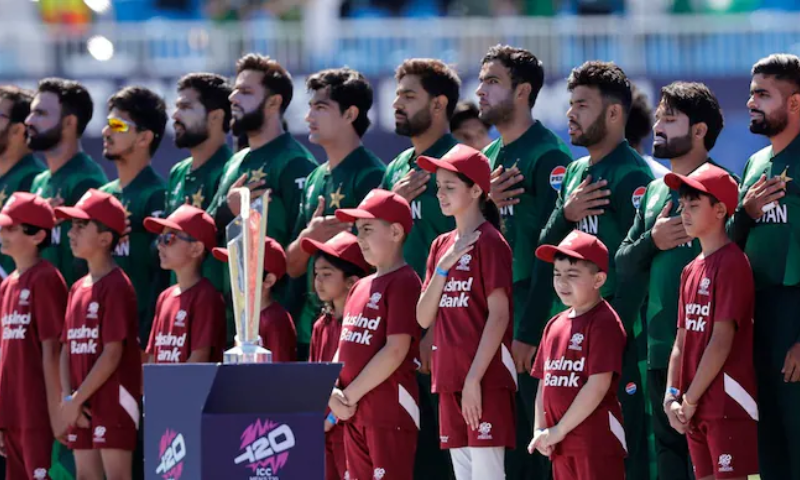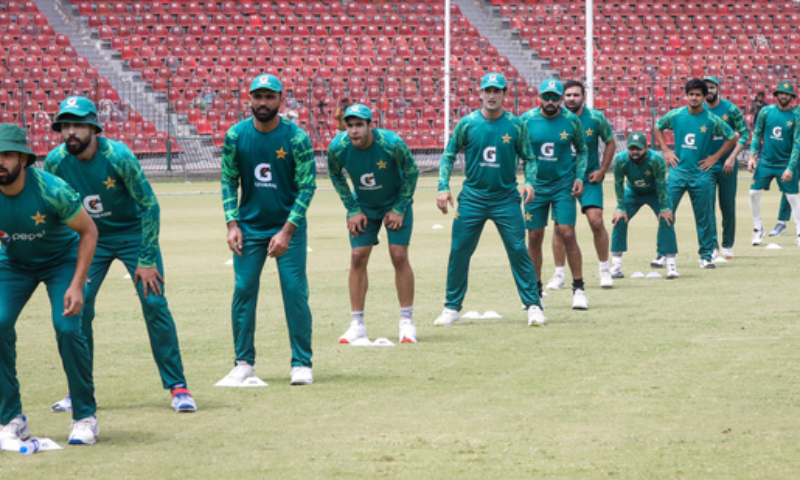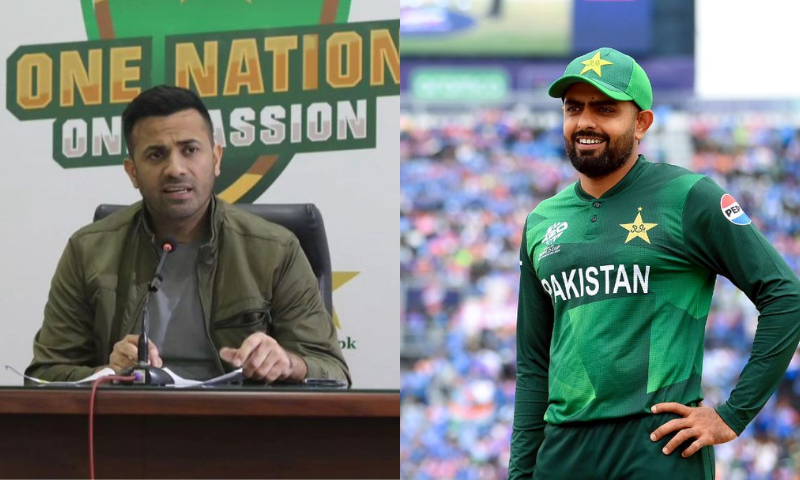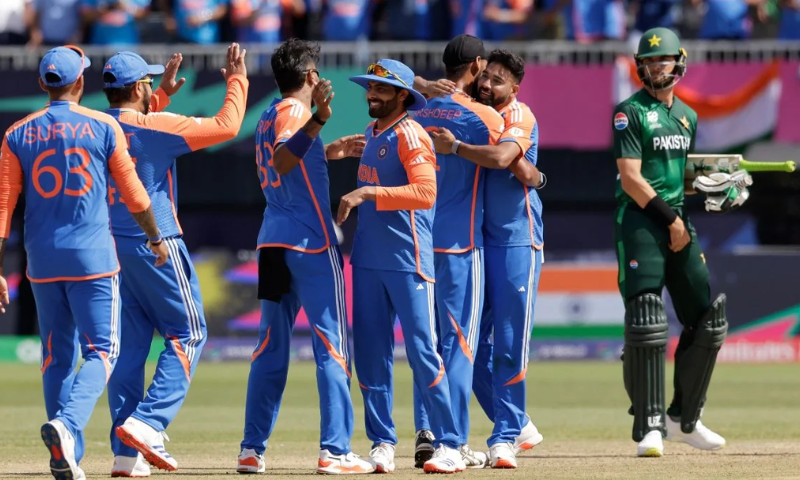There are a few clichés that we have been listening to for decades now: Pakistan is passing through a critical phase. That is for our beloved country.
For the beloved sport, cricket, we always proclaim: the team is passing through a rebuilding phase. That comes after every failure and the failures are aplenty.
Pakistan cricket team crashed out of the first round of Twenty20 World Cup in the United States after a catastrophic performance, leaving a cricket-mad nation with only one sport to cherish, follow and adorn despondent. The manner in which the team lost to part-time cricketers of the USA was despicable as the professional and full-time cricketers looked insipid and spooked. Very few people had expected Pakistan to beat arch-rivals India as the past record was evident that the neighbours had a stranglehold on us. But despite restricting India to a paltry total of 119, Pakistan lost from a winning position proved that there is a mental block.
After losing to India, Babar Azam and his men did not have destiny in their hands and they were hoping while the fans were praying that the Ireland does them a favour by beating the rampaging USA, but nature had other ideas as rain gave the co-hosts a crucial point to throw Pakistan out and they sneaked into the Super Eight.
All those who were following the Pakistan team knew this was coming. But surprisingly, Pakistan Cricket Board and all those who were involved in the build-up did not see it coming. But the situation was akin to ostriches hiding their heads in the sands or closing their eyes like a pigeon. There will be flesh on the bone, regarding the causes of the abysmal show, once head coach Gary Kirsten files his report. But, if true, Kirsten’s leaked conversation in a team meeting blaming lack of unity, poor skill set and not playing as per the modern norms of T20Is summed up what the team was lacking.
Babar Azam should also come out with his version which will give the auxiliary support that may help in altering things.
Poor build-up:
Most of the pundits had not counted Pakistan amongst the favourites. Some even did not see Babar XI reaching the last four but none had predicted the Team Green would crash out in the first round was not in everyone’s calculation or imagination. But since the 2022 Twenty20 World Cup this implosion was imminent, albeit in a slow but steady process.
The Pakistan team had a deep-rooted lack of confidence. The team management, players and all those running the team in the PCB were in a slumber and were ready to address the problems. Pakistan losing the first T20I against minnows Ireland should have sent alarm bells but wins in the next two matches and the series hid the problems.
Pakistan losing 2-0 to a formidable England was on the cards but mistakes after mistakes were repeated in all these matches of the European tour. Azam Khan kept the wickets despite the fact that Mohammad Rizwan is the man to be given the task in crunch matches, especially in the World Cup. Spinner Abrar Ahmed and Agha Salman were not given chances in the five completed matches, leaving the bench untested.
Off the field, the change in captaincy hit the team hard. Shaheen Shah Afridi was replaced with Babar Azam. It defied logic but the powers-that-be wanted the change. It seemed illogical that after the ODI World Cup disaster – Pakistan failing to clear the first round – Babar was forced to step down as he did not show signs of improving as a leader and bringing him back did not serve the team well. A top man from the management during the ODI World Cup had revealed that Babar had lost popularity within the team. Bringing him back led to a discord and disenchantment in the dressing room.
If head coach Gary Kirsten’s leaked conversation in a team meeting were true then it proved that the captaincy change was not appropriate.
Selection Shenanigans:
Pakistan was the last team to announce the World Cup squad, barely hours before the ICC deadline of May 25. It showed the confusion in the ranks. A seven-man selection panel – with skipper Babar and incoming head coach Kirsten – was announced but it proved akin to “too many cooks” as the announcement was delayed as one selector complained that he was not taken into account. It prompted the PCB chairman Mohsin Naqvi to demand minutes of the selection committee meeting and that a thorough process should be followed.
Pakistan was confused in their selection. They had three extra players – Agha Salman, Hasan Ali and Irfan Khan — on the European tour and those were finally left out. Mohammad Amir and Imad Wasim were recalled after they came out of retirement. Both had not played domestic cricket and their return and subsequent inclusion was injustice to all those who were performing at the domestic level. With Amir brought back, Pakistan had to leave out T20 death bowling specialist Zaman Khan and the rising pacer Mohammad Wasim. Usman Khan was selected. Although Amir did well overall, his poor execution of the Super Over against the USA left questions over his fitness and merit. Imad missed the game against USA with a lingering side strain while his batting let Pakistan down in the dying moments against India. Imad had won Pakistan quite a few games in white ball cricket but at New York he failed against Axar Patel. Pakistan lost the crucial match from a winning position.
Leg-spinner Usama Mir’s exclusion was a big injustice. Usama was the highest wicket taker in the PSL 2024 and deserved a place in the World Cup squad. Shadab’s selection was only justified as with 305 runs and 14 wickets he was the “player of the tournament” in PSL 9 but his numbers – both as bowler and batter – were well short in international matches. Shadab failed, and failed big. His only contribution was 40 against the USA. His three overs in the match were wicket-less and the only against Ireland went for 11 with nothing in the wicket column.
That Shadab was kept in the eleven despite his poor numbers went against him.
Azam Khan and Iftikhar Ahmed also failed to justify their places. Both were described as “match winners” by Babar but they were not. In a bizarre move Iftikhar was given the task to face the Super Over despite the fact that the man at the other hand was a left-hander in Fakhar and could have been better suited against a left-armer. Then, against India Iftikhar came a cropper against Bumrah’s low full tosses, leaving a question mark over his status.
One-drop batter Usman Khan also failed to impress. He was primarily selected on two hundreds he scored in this year’s PSL but gave an impression that he was not ready for international cricket.
Babar not the only to blame:
One of the factors in Pakistan’s downward slid has been ineffective, careworn and defensive captaincy from Babar Azam. Had he turned down the offer to lead the team it would have kept the team bonding as well as Babar himself would have been at ease as a batter. Because he was not a popular skipper Babar came under duress and could not perform as well as the team needed.
Pakistan’s conservative batting and non-existent middle-order was partially because of Rizwan and Babar’s slow approach as openers. Pakistan did try Saim Ayub in most of the lead-up matches but the young left-hander was more worried about his strike rate and no-look shots that failed him miserably. In spite of going back to Fakhar Zaman, Pakistan returned to the same old approach of Riz-Babar.
The most sordid factor about Babar’s captaincy is his backing friends. Babar enjoyed great power in team selection and that, at times, made him unaccountable.
The aftermath:
Pakistan’s crashing out, the reports of grouping in the team and captaincy causing problems all have not been new in Pakistan cricket. History is replete with such problems. Despite being a strong unit with Wasim Akram, Waqar Younis, Shoaib Akhtar, Inzamam-ul-Haq, Saeed Anwar and Mohammad Yousuf in the ranks, Pakistan failed to go beyond the first round in the 2003 World Cup.
The story was repeated in the 2007 event in the Caribbeans. This time too Pakistan had a formidable team under Inzamam. Pakistan’s head coach Bob Woolmer also died a day after the team was upset by Ireland to crash out of the event. The 2023 event had the same disaster as Pakistan failing to reach the semi-finals.
All disasters led to knee jerk reactions. The sacking of captains, coaches, selectors and the management have all been sacked in the aftermath of disasters. This same old story will be repeated.
We need to change that. We need to address the main problems. There should be short-term and long-term plans. We need to improve the style of play in white ball cricket by inducting some young players and grooming them. We have been lagging behind in intent. That is the first step. We need to improve our domestic cricket. Pakistan cricket is at the crossroads yet again. The road to improvement is a long journey and it should be covered with a neat, honest and comprehensive plan.




























